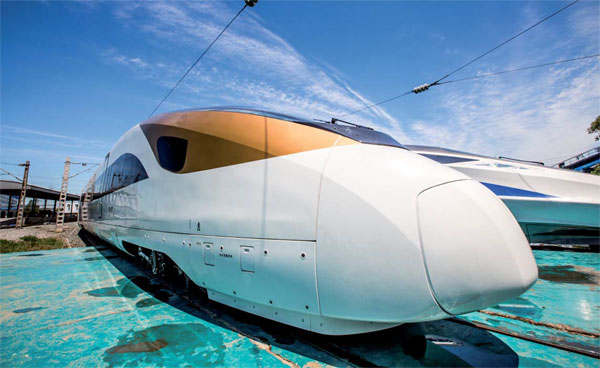A vital link in high-speed growth
Updated: 2015-08-28 08:30
By Cecily Liu(China Daily Europe)
|
|||||||||||
UK's HS2 project may offer foothold to Chinese rail industry
|
China Railway Rolling Stock Corp is a promising candidate for the UK's high-speed railway project, High Speed 2. Photo provided to China Daily |
The UK's new high-speed railway project, High Speed 2, could be a good opportunity to help the fast-growing Chinese railway industry gain a foothold in developed markets, experts say.
Although official bidding for HS2 hasn't yet started, it is believed that China's largest maker of rolling stock, China Railway Rolling Stock Corp, is a promising candidate, given its extensive experience accumulated through building thousands of miles of high-speed rail in China.
CRRC has yet to confirm its intention to bid for HS2, but in May it demonstrated commitment to the UK market by opening a subsidiary and a research and development center in cooperation with three British universities.
James Jameson, vice-president of product strategy at Rivo, a British company that supplies safety software to the rail industry, says Chinese railway technology has the unique advantage of being cost effective.
He says cost-saving techniques have been accumulated through experience and the Chinese high-speed railway industry's economies of scale, and they can bring great benefits to the UK.
"The cost-saving comes from the actual trains, the knowledge and the massive economy of scale. The Chinese firms have technology that's developed over the years, which is tried, tested, improved and highly valuable," he says.
The UK government is planning HS2 in two phases. The first phase, which links London and Birmingham, will start construction in 2017 with an indicated opening date of 2026 and government-estimated cost of 22 billion pounds.
This will be followed by phase two, an extension to Manchester and Leeds opening by 2033. Other companies which that expressed interest include France's Alstom, Siemens AG of Germany and Japan's Hitachi Ltd.
In addition to HS2, once Chinese railway firms localize their railway technology in the United Kingdom, they can build up these economies of scale for further exports to Europe, Jameson says.
"There are great opportunities for Chinese railway firms to further expand into Europe. Apart from the UK's extension of its high-speed rail network, Europe has plans to triple its high-speed rail by 2030," Jameson says.
He says Chinese railway firms can apply their technology to other railway projects in the UK and Europe, as there are great amounts of transferable technology between high-speed trains and other projects, such as Britain's Crossrail Two. Examples of transferable skills include the signaling of the trains system and the laying of the tracks, he says.
"It doesn't have to stop at high-speed rail, there are other major rail infrastructure projects where skills and technologies can be transferable. However, in addition to having great technology and cost advantage, Chinese railway firms also need to demonstrate that they are willing to invest in the UK economy in order to win significant parts of projects such as HS2."
Jameson says for Chinese railway firms to win UK projects, it is important for them to create local employment.
It also makes sense for Chinese railway firms to work with UK partners, because the UK has great advantage in specific railway technology, such as signaling and railway digital communication, and these components in the high-speed train supply chain are exported all over the world, he says.
Today's Top News
Xi's trip to herald 'golden decade' for relations
Wanda's chairman Wang again becomes richest Chinese
Ex-NBA star Odom reported critical, Kardashian at his side
Country house to add English tradition to Xi, Cameron meeting
Most Chinese cities failing air quality standards: Report
Xi to initiate 'golden era' in China-UK ties
China's September inflation cooler than expected
Sensible strategic move by Russia to give Assad support
Hot Topics
Lunar probe , China growth forecasts, Emission rules get tougher, China seen through 'colored lens', International board,
Editor's Picks

|

|

|

|

|

|







